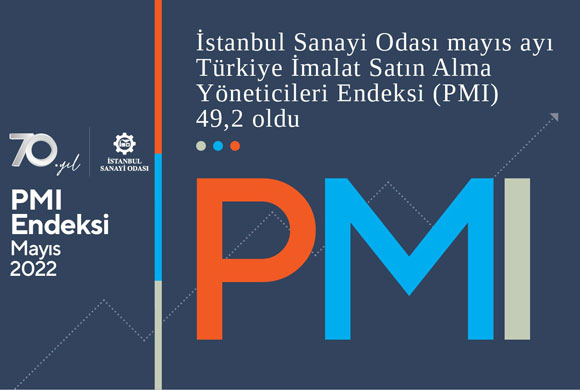News
ICI Türkiye Manufacturing PMI May 2022 Report and Türkiye Sectoral PMI Report Announced
- 01.06.2022
- News

The Istanbul Chamber of Industry Türkiye Manufacturing PMI, which is the fastest and most reliable reference accepted in manufacturing industry performance of the economic growth, was unchanged from the previous month at 49.2 in May. It signalled a third consecutive month of contraction in Türkiye’s factory activity, though at a moderate level.
According to the Istanbul Chamber of Industry Türkiye Sector PMI report for May, seven out of 10 monitored sectors posted an increase in output while three sectors moved back to the growth zone. The fastest increases in output were in the clothing and leather products sector as well as for non-metallic mineral products sector. The number of new orders also rose in the majority of the sectors. There were considerable difficulties in external demand, and exports increased in only three sectors. The trend of improvement in job creation continued to a wider scale in May.
The May 2022 period of Istanbul Chamber of Industry (ISO) Türkiye Manufacturing PMI (Purchasing Managers’ Index) survey, which is the fastest and reliable reference accepted in manufacturing industry performance of the economic growth was announced. According to the results of the survey where any figure greater than 50.0 indicates overall improvement of the sector, the headline PMI was unchanged from the previous month at 49.2 in May. It signalled a third consecutive month of contraction in Türkiye’s factory activity, though at a moderate level. Both output and new orders slowed down during May, extending the current periods of easing to six and eight months, respectively as customer demand remained subdued. In both cases, however, there were tentative signs of improvement as rates of moderation softened. Meanwhile, new export orders eased to the greatest extent in two years, with some firms highlighting an economic slowdown in Europe.
Manufacturers continued to raise employment as part of efforts to expand capacity. Staffing levels were up for the twenty-fourth month running, albeit modestly. With new orders slowing and employment continuing to rise, firms were able to reduce backlogs of work again in May. Meanwhile, subdued new order inflows contributed to stockbuilding. Stocks of purchases increased for the first time in six months, while a rise in stocks of finished goods ended an eight-month period of depletion. The accumulation of post-production inventories was the most marked since September 2015.
There were further signs of inflationary pressures easing midway through the second quarter. While input costs increased sharply with rising raw material prices and exchange rate fluctuations, the rate of inflation eased for the fifth month in a row to the softest since February 2021. A slower rise in output prices was also signalled.
Supply-chain disruption also eased, with the latest deterioration in vendor performance much less pronounced than that seen in April and the least marked overall since September 2020.
Commenting on the Istanbul Chamber of Industry Türkiye Manufacturing PMI survey data, Andrew Harker, Economics Director at S&P Global Market Intelligence, said:
"Demand in the Turkish manufacturing sector remained subdued in May amid the familiar headwinds we've seen in recent months, with firms also struggling to secure export business amid an economic slowdown in Europe. That said, there were some signs that doing business might start to get easier soon. In particular, supply chain constraints were the least pronounced since September 2020, while cost inflation eased for the fifth month running. A sustained period of job creation means that firms will be ready should these tentative improvements result in renewed order growth."
Manufacturing rises in four of the 10 monitored sectors
According to the Istanbul Chamber of Industry Türkiye Sector PMI report for May, seven out of 10 monitored sectors posted an increase in manufacturing while three of these sectors moved back to the growth zone. The fastest increases in output were in the clothing and leather products sector as well as for non-metallic mineral products sector. Textile production remains horizontal, while machinery and metal products and main metal sectors showed a slowdown. Similarly, the number of new orders increased in the majority of sectors. The strongest performance was in the clothing and leather products sector, while the most significant slowdown was in the main metal industry. There were considerable difficulties in external demand, and exports increased in only three sectors.
The trend of improvement in job creation continued to a wider scale in May. The fastest increase was in the machinery and metal products sector. Firms in most of the sectors increased their purchasing activities with the signs of improved demand conditions.
Manufacturers continued their input purchases, but also continued to experience delays in deliveries in most cases, despite signs of improvement. The most significant delay in delivery times was recorded in the electrical and electronic products sector. On the other hand, supplier performance improved in wood and paper products and in the main metal sectors. While input cost inflation eased in many sectors, the lowest rate of increase was recorded in the basic metal sector. The fastest rise was observed in non-metallic mineral products. The basic metals was the sector with the most moderate increase in sales prices due to the weaker demand and slowing input costs inflation. In other sectors, output price inflation was generally high. In May, half of the sectors increased their output prices faster compared to April.